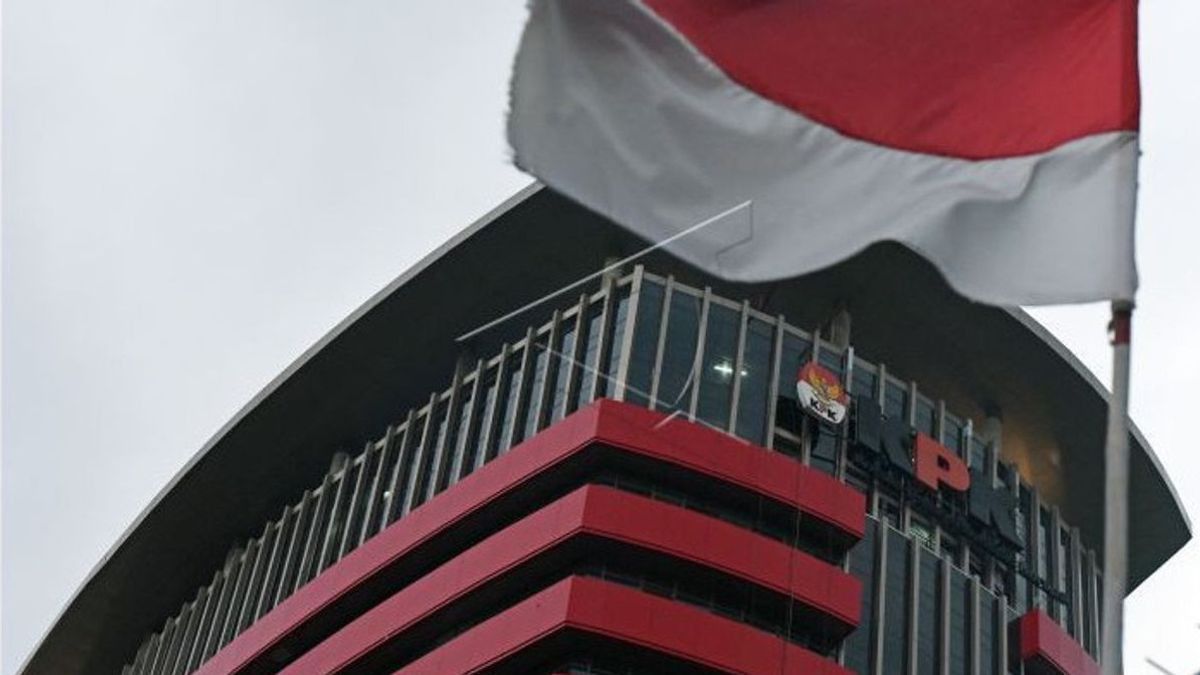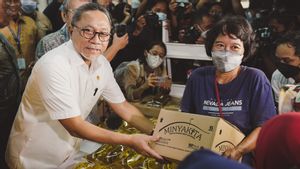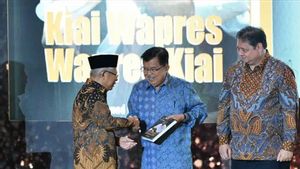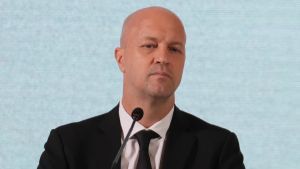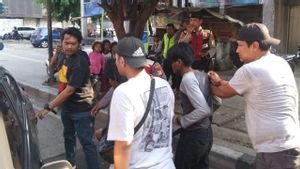JAKARTA - As many as 75 employees of the Corruption Eradication Commission (KPK) have not passed the national insight test. 51 of them were dismissed. They are associated with a radical Islamist group that is often called the 'Taliban'. Where did the KPK Taliban issue start?
The Taliban is an Islamic fundamentalist group that controlled Afghanistan from 1996 to 2001. The Taliban was formed in the 1990s by Afghan mujahideen or Islamic insurgents who fought the Soviet occupation of Afghanistan (1970-1989).
This movement was dominated by the Pashtuns, who later became known as radical and militant. The common thread between the Afghan Taliban and the KPK Taliban is militancy.
The term was first coined by the Chairman of Indonesia Police Watch, Neta S. Pane in 2009. In a press release, Neta commented on an open letter from the 50 Indonesian Police investigators who served at the KPK.
They – police investigators – questioned the appointment of 21 investigators who became independent investigators at the institution. Neta wrote that there was a split in the KPK into two camps, namely the Indian police and the Taliban group.
“Indian police refer to KPK investigators who come from the police institution. Meanwhile, the Taliban Group referred to the investigator Novel Baswedan who was supported by the KPK Employee Forum. This group, mentioned in the letter, is also considered militant because it often questions the leader's policies," said Linda Trianita, Anton Aprianto and Mustafa Silalahi in their article in Tempo Magazine entitled Taliban in the Selection of KPK Leaders (2019).

The issue of the Taliban is getting louder and louder through the mouths of a number of lawyers who often handle cases at the KPK. They claimed to hear the term there is a Taliban stronghold in the KPK.
This stronghold of the Taliban is considered to always handle cases with big names. Baswedan's novel appears as one of the names that is often associated with conservative Islamic groups simply because he has a thick beard and often wears a robe.
A number of law enforcers at the KPK said that the issue of radicalism – in the form of the Taliban Group – was the selection committee's way of thwarting Novel Baswedan's move to lead the KPK.
The selection committee collaborated with the National Counter-Terrorism Agency (BNPT) and the State Intelligence Agency (BIN) to trace the track records of the candidates for the KPK leadership. The selection committee argued that they did not want the elected candidates to be exposed to radicalism.
This understanding is feared to be a problem in the KPK. Recently, the issue of the Taliban has again shocked the virtual world, especially Twitter.
[INTERVIU: Law | Chairman of the KPK Employee Forum Yudi Purnomo on How TWK Disrupts Handling of Corruption Cases]
The issue developed rapidly as a form of efforts to weaken the KPK. The weakening of the KPK has taught the public that social media is easily hijacked by the oligarchic elite through cyber troops and computational propaganda.
The founder of Drone Emprit (DE), Ismail Fahmi, once discussed this. Based on DE research, the movement to weaken the KPK was supported by the presence of massive cyber forces that carried out attacks against the movement against the revision of the KPK Law, an issue that was rolling at the time.
The debilitating hashtags, among others, read that the KPK is #KPKdanTaliban, #KPKPatuh Rules, #KPKCengeng and so on. "The hashtag for the Taliban KPK has succeeded in making the public doubt the KPK and suspect the anti-corruption agency as a hotbed of radicalism," said Widjayanto DKK in the book Saving Democracy (2020).
"In his description, DE concludes that the movement of academics who carry out Twitter campaigns sporadically has lost to the Taleban KPK hashtag which is much more massive and systematic. This makes DE conclude that there is a phenomenon of death of expertise."
Firli Bahuri exploits the Taliban issueBenydictus Siumlala Martin, a functional employee of the KPK, as described in a BERNAS article entitled Impossible to Have a Cross in the Taliban said that there has never been radicalism in the KPK. If anything, it does not refer to any particular religious teachings.
"If you say that friends at the KPK are radical, radical in eradicating corruption, yes. But if you are radical then it leads to right extremism or something like that, it doesn't feel like it," said Beny, his familiar greeting.
Chairman of the KPK Employee Association Yudi Purnomo, in an INTERVIU article entitled [LAW] Yudi Purnomo | About How TWK Disrupts Handling of Corruption Cases agrees with Beny.
From the eyes of Yudi, the person who oversees the KPK employees with religious, ethnic, and racial backgrounds, "tolerance is not a new thing at the KPK." Yudi said the issue of the Taliban was nothing more than a narrative that was deliberately constructed for the purpose of paralyzing efforts to eradicate corruption. In accordance with the Drone Emprit (DE) presentation, Yudi assessed that the issue was built by a buzzer.
I do not know who is behind the buzzers who deliberately maintain the issue of Taliban radicalism in the KPK. What is clear is that the chairman of the KPK, Firli Bahuri, took advantage of the issue. On April 29, there was a meeting between KPK leaders in the main meeting room on the 15th floor of the Red and White Building. During the meeting, Firli asked 75 employees who did not pass the TWK to be dismissed immediately.
Quoted from the results of the Indonesia Leaks investigation published in the Sunday edition of Tempo Magazine, June 6, Firli even mentioned June 1 as the deadline for dismissal. KPK Deputy Chairman Nawawi Pomolango supported Firli and asked his subordinates to immediately execute the order.
But an official from the Law Bureau asked Firli and Nawawi to consider it. The official considered Firli and Nawawi's ideas vulnerable to being sued by the State Administrative Court (PTUN). The official suggested that employees who did not pass the TWK should still be given the opportunity through education and training.
According to an Indonesian Leaks source, Firli refused. He is firm in his decision. "Wow, you can't. They must be dismissed on June 1. Or we ask them to resign," an Indonesian Leaks source imitated Firli's words.

Firli's intention to get rid of the employees in 'List 75' had actually been seen from the start. Precisely when drafting regulations governing the transfer of status of KPK employees. After the issuance of Government Regulation Number 41 of 2020 concerning the Transfer of KPK Employees to ASN in July 2020, the KPK held a number of discussions with legal experts and bureaucrats from various institutions.
The discussion took place from September to December 2020. During that time there was never any idea about TWK. As for the nonsense about the test, it only mentions the assessment. It was at that meeting that Firli ordered the KPK Legal Bureau to include the TWK article in the draft regulation. Firli argues that there is radicalism that must be dealt with.
"Did you forget? There are many 'Taliban' here," said Firli.
TWK then appeared suddenly in the January 22 version of the draft commission rules. The substance is considered odd because it did not go through a special discussion meeting. The draft changed again in the January 25 version. In that version, TWK is stated in Article 5 Paragraph 1. It is stated that TWK is organized by the KPK together with the State Civil Service Agency (BKN).
Since then there has been no harmonization. It was reported that Firli himself brought the draft to the Ministry of Law and Human Rights (Kemenkum HAM) for promulgation. This is considered unusual because before it was promulgated, the draft should have been discussed through harmonization, which at least involved structural employees at the level of the Legal Bureau and the Bureau of Human Resources.
On January 27, the Ministry of Law and Human Rights officially legitimized KPK Regulation Number 1 of 2021 which included the TWK article. Menkum HAM Yasonna Laoly only answered "Ask later, yes," when asked for clarification.
*Read other information about the KPK or read other interesting articles from Detha Arya Tifada, Wardhany Tsa Tsia and Yudhistira Mahabharata.
Other MEMORIESThe English, Chinese, Japanese, Arabic, and French versions are automatically generated by the AI. So there may still be inaccuracies in translating, please always see Indonesian as our main language. (system supported by DigitalSiber.id)
